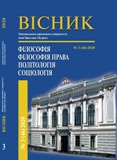ІДЕОЛОГІЯ ЯК МЕХАНІЗМ КОНСТРУЮВАННЯ ПРОСТОРУ: ІМПЕРІЯ VS ДЕРЖАВА МОДЕРНУ
IDEOLOGY AS A MECHANISM OF CONSTRUCTING SPACE: EMPIRE VS MODERN STATE
Author(s): Ruslan Oleksandrovych ZaporozhchenkoSubject(s): Politics / Political Sciences, Politics and society, History and theory of political science
Published by: Національний юридичний університет імені Ярослава Мудрого
Keywords: ideology; empire; state; modernism; space;
Summary/Abstract: Problem setting. In modern political discourse, the phenomenon of ideology is almost not considered as an independent social process. Ideology is studied as derived from politics or economics, thus forming a field of study of political and economic ideologies (liberalism, socialism, conservatism, etc.). In addition, the issues related to the functioning of ideology in the context of the study of empire as a political form of spatial organization become partially or almost unstudied. Researchers also ignore the issue of the influence of ideology on the construction of the socio-political space of modern empires and states with their inherent similarities and differences.Recent research and publications analysis. In the last few years, a certain trend in the study of ideologies has emerged in the social and political sciences. The first one (Mierzejewski D., Kowalski B., Jha B.) is focused on the analysis of socio-cultural and national aspects of ideology (politics of memory and identities, nationalism and nation- building, cultural aspects of the functioning of ideologies). The second one (Piketty T., Goldhammer A., Isaacs R.) emphasises the study of economic aspects of ideology, including issues of economic inequality, ideological divisions in society, the impact of political ideology on the functioning of the economic system.Paper objective. The purpose of the article is to determine the features of ideology that affect the construction (organization) of the space of the empire and the modern state. To solve this goal it is necessary to perform the following research tasks: 1) review of theoretical and methodological concepts regarding the definition of «ideology»; 2) definition of the main (dominant and meaningful) structures of ideology.Paper main body. In the analysis of ideology, we rely on the research of D. Lukacs, L. Althusser, S. Zyzek, who define ideology as a form of consciousness and a set of systemic ideas and social practices of individuals. Ideology is analyzed using structural-functional, retrospective and factor analysis, which allows to identify both the structures of ideology and its main features, including: mythologizing the present and past, centralization and decentralization, universalization and particularism, citizenship and cosmopolitanism, sacralization of power and religions factor, marking of space and its symbolization, dichotomy of law and traditions.Conclusions of the research. The structural-functional and normative-value characteristics of ideology that have an impact on the process of formation of the socio-political order within a specific space are determined. The definition of imperial ideology is outlined, which is presented as a tool for organizing space, based on the mythologizing of the present, particularism and cosmopolitanism, and focuses on the construction of the own imperial world, in which the construction of the imperial order is taking place.
Journal: Вісник НЮУ імені Ярослава Мудрого. Серія: Філософія, філософія права, політологія, соціологія
- Issue Year: 46/2020
- Issue No: 3
- Page Range: 206-219
- Page Count: 14
- Language: Ukrainian

